new posts in all blogs
Viewing: Blog Posts Tagged with: Promotion & Marketing, Most Recent at Top [Help]
Results 1 - 8 of 8
How to use this Page
You are viewing the most recent posts tagged with the words: Promotion & Marketing in the JacketFlap blog reader. What is a tag? Think of a tag as a keyword or category label. Tags can both help you find posts on JacketFlap.com as well as provide an easy way for you to "remember" and classify posts for later recall. Try adding a tag yourself by clicking "Add a tag" below a post's header. Scroll down through the list of Recent Posts in the left column and click on a post title that sounds interesting. You can view all posts from a specific blog by clicking the Blog name in the right column, or you can click a 'More Posts from this Blog' link in any individual post.
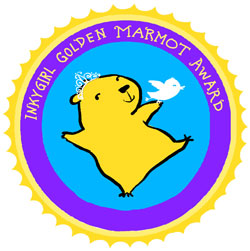
It's been a while since I've awarded the Incredibly Prestigious and Exquisitely Ephemeral Golden Marmot Award, but this week it NEEDS to go to Chuck Wendig for this wonderful tweet:

In my recent survey, I asked those of you working with agents to answer a few questions about how you got your agent. First off, thank you SO MUCH to those who took the time to respond in order to help others in the community. These include: Hayley Chewins, Julie Glover, Kellie DuBay Gillis, Michael Wayne, Anne Marie Pace, Kristin Gray, Denise Gallagher, Corey Schwartz, Beth Ferry, Julie Dao, Stephanie Diaz, Russ Cox, Sarah Albee, Stephanie Fletcher-Stephens, Ashlyn Anstee, Melissa Caruso, Julie Falatko, Bruce Hale, Mike Jung, Heidi Schulz, Amy Lozier, Josh Funk, Jim Averbeck, Edward Willett, Kelley McMorris, Annie Cardi, Carter Higgins, Susan VanHecke, Jennifer Gray Olson, Andria W. Rosenbaum and Juana Martinez-Neal. Others responded anonymously.
74 people responded and almost all were children's/YA book writers or illustrators. Most got their agent through an email query.
While researching agents and given the choices in my survey, respondents said the most useful resources of the ones I listed were Twitter, Publisher's Marketplace, AgentQuery.com, SCBWI conferences and Literary Rambles, followed by Writer's Digest resources like the annual Children's Writer's & Illustrator's Guide and Chuck Sambuchino's Guide To Literary Agents. This survey was mainly conducted through Twitter, so it's not surprising that Twitter came out on top.
Do scroll down to read some of the info-packed comments about other useful resources like QueryTracker, agency blogs and websites, AbsoluteWrite forums, SCBWI BlueBoard forums. Comments also include info about people got their agents, such as getting noticed during the 12x12 Picture Book Challenge, Preditors & Editors, #PitMad on Twitter (Pitch Madness - learn the rules before participating!) and #MSWL on Twitter (Manuscript Wish List - learn the rules before participating!).
Here's a further summary and breakdown of the results as of today (August 14, 2015).
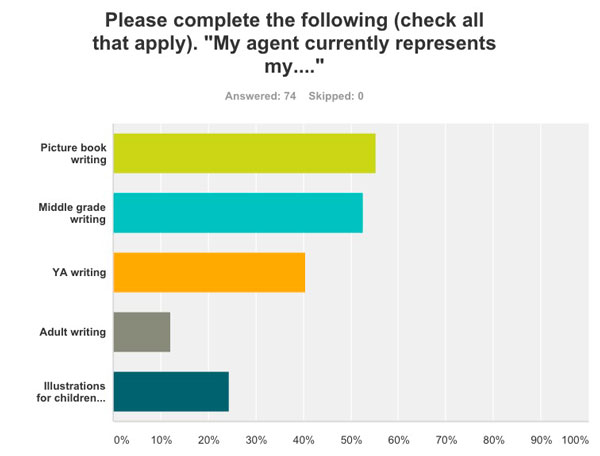
As you can tell from the above, most of the respondents' represented work focuses on children's/YA writing. About 25% had agents representing their children's book illustration work.
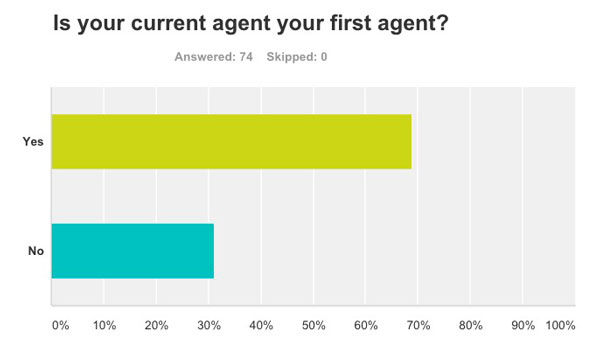
Approx. 70% of respondents said they were working with their first agent. The others had worked with other agents before.
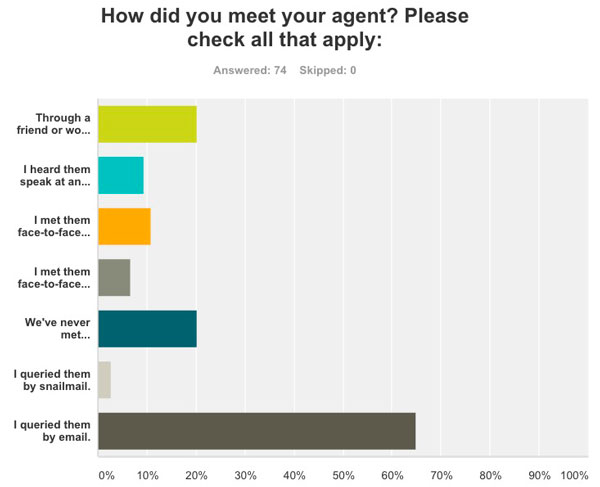
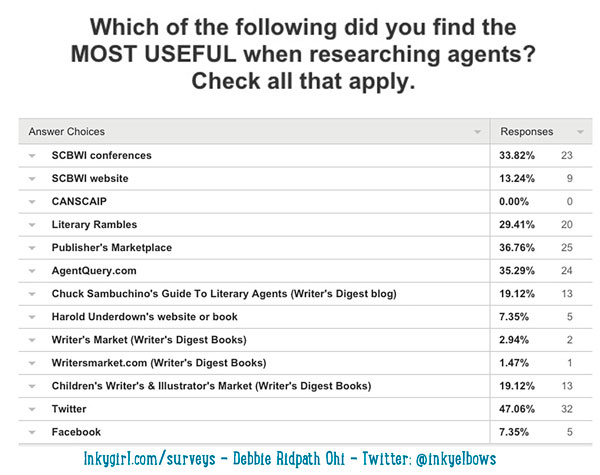
Here are some of additional comments about useful resources while researching agents:
"Online searches about what agents said and represented, conversations with authors already in the publishing business." - Julie Glover
"The SCBWI blueboard! Also, agent's blogs and agency websites." - Kellie DuBay Gillis
"Author friends - individual agent google searches which often bring up a variety of insightful blog interviews - agency websites." - Michael Wayne
"Probably most helpful was just googling agents to find interviews and other information, especially agency websites. Facebook was helpful mostly because of a private Facebook group of PitchWars '14 mentees that I belong to--networking with other writers is a big help. I also used QueryTracker. The AbsoluteWrite forums are usesful too."
"When I signed with my agent in early 2007, Facebook was just catching on and I don't think anyone had Twitter yet--okay, I checked Wikipedia--it was very small at that time! The Children's Writers and Illustrators Market was only in hardcover, not online! Much has changed, very quickly!" - Anne Marie Pace
"Recommendations from other agented writers, and recommendations from my former agent."
"12 x 12 picture book challenge submission."
"Also Querytracker." - Kristin Gray
"Pitch Madness on Twitter!" - Denise Gallagher
"I also learned about a lot of agents and agencies through other writers and through contests. (This is mostly where Twitter comes in... as a vehicle for word of mouth.) I used Publisher's Marketplace and AgentQuery more as a secondary reference to look up more info on agents, rather than a place to find them in the first place." - Melissa Caruso
"Querytracker.com, pred-ed.com." - Russ Cox
"General online research, agent interviews, etc."
"One of her clients gave me a referral." - Corey Schwartz
"Google. And, of course, the official agency websites are huge sources of information."
"Blog post loutreleaven showing a list of literary agents."
Additional comments about how they met their agent:
"We had never met face to face, but she contracted me after seeing my work in the Portfolio Showcase. Then we met (face to face) a few weeks later. A month or so after that, I signed with her agency. We have seen each other a few times since I signed, but mainly we communicate via email (and occasionally phone)."
"We met through the #PitMad Twitter pitch contest where she requested my work!" - Julie Dao
"I heard her speak at an SCBWI Editor's Day. The following year, I had her critique one of my manuscripts for SCBWI Agent's Day, and was signed soon after." - Stephanie Fletcher-Stephens
"Online via Verla Kay's Blueboards and my blog. Joan contacted me to request pages." - Mike Jung
"It was a case of right match, right time. I liked what he said in his talk, took advantage of his offer to submit stories, and found that he really liked one of my pieces -- enough to represent me." - @storyguy1
"I was referred by another agent."
"I queried her by email before an SCBWI event that I was volunteering at and she was speaking at." - Jennifer Gray Olson
"Personal reference from one of her existing clients." - Josh Funk
"Answered request from Manuscript Wish List (#MSWL)."
"They noticed me because I won the SCBWI Student Illustrator Scholarship." - Kelley McMorris
"Through my MFA program (VCFA)- she was a fellow student at the time." - Amy
"I met my agent through a #PitMad twitter pitch event."
"I had planned to query her based on research I'd done, but she invited me to submit my query letter, synopsis, and first 3 chapters from a Twitter pitch."
---------------------------------
Again, THANK YOU SO MUCH for those who took the time to respond!
If you have comments or suggestions, including your own experience with researching and finding an agent, I encourage you to post below.
If you haven't already, feel free to also check out my list of agents on Twitter who represent kidlit/YA as well as my FAQ post about finding an agent (and how I found mine).
Curious about my other publishing industry surveys? Feel free to browse current and past Inkygirl Surveys online.
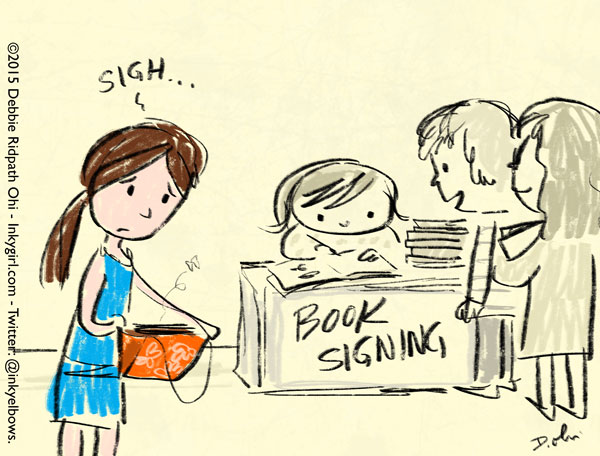
The quandary: You want to support someone's new book and as much as you'd like to buy it, you can't. Perhaps you can't justify the cost of the new book right now. Perhaps your author friend is prolific and has multiple books coming out, and you can't afford to get them all. Perhaps you have so many author and illustrator friends that if you tried to buy all their books, you'd need to sell your car first. Or your house.
Here are some other ways you can show support for an author's book:
First, read the book. How do you read it without buying it? Borrow it from the library. For picture books, you could even read the book AT the bookstore.
Reserve a copy at the library. At least at some libraries, this helps show the library that at least one person is interested in that book. If popular enough, the library may order more copies.
Review/rate the book. Post a rating and/or review in sites like Goodreads, LibraryThing, Amazon, BN.com or your own blog. If you didn't like the book, don't lie. Nilofer Merchant suggests using a phrase like "this book is not for you if you are xxx" because even this kind of negative review may help others know the book IS for them. Take a few extra minutes to browse the other reviews of the book and then (if the feature's available) Like the reviews that you did like or found helpful.
When you read the book, read it where people can see it. Not sure about the rest of you, but I'm always surreptitiously checking out the covers of books that people read in public. This is where print books have the advantage of digital. Read the book on public transit, in the park, on the beach, at the airport, while waiting in line. You never know when people will decide to check out the book just because they saw you enjoying it.
Recommend the book to others through social media. Including the book cover (either scoop the cover image from the publisher/author/illustrator website or photograph the book cover in the library or bookstore) especially helps. Even just a short "Loved this book!" along with the cover will be appreciated. You can make it even more personal by adding a reason why you loved it. Take the time to tag the author or illustrator; tagging not only alerts the author/illustrator to the post but it also encourages people to click your tag link to find out more about the person.
Share and retweet the author's or illustrator's posts. Be judicious -- don't share/retweet everything, especially if you tend to share/retweet a lot on your feed. To authors and illustrators: make sure your post is PUBLIC if you want it shared. I can't tell you the number of times I've started to share someone's FB post but then discovered that it's a Friends-Only post; even if I shared it, the only people who see it would be our shared friends who already have it in their feed. If you're confused, read this FB support page about how to control who sees your posts.
Post a photo of the book in the wild. Especially around launch time, I find that social media sometimes gets inundated with images of just the book cover. Make your post more personal by taking a selfie of you holding the author's book, or another reader with the book -- photos with people in them always get more Like-love. Or take a photo in a fun setting, like adding a cup of tea beside a picture book about a tea party, for example. Or if you see the book in your local bookstore or library, take a photo and tag the author or illustrator. I can't speak for other author/illustrators, of course, but I always appreciate when someone does this.
If the author or illustrator is on YouTube, subscribe to their channel so you can more easily find out when they upload new trailers or videos.
Talk about the book. Don't underestimate the power of word-of-mouth. Recommend the book to friends, work colleagues, your local bookseller and librarian. When a friend of mine recommends a book they personally like and think I'd like, too, I pay MUCH more attention than when I see a generic "this new book just came out, you should get it!" post on social media.
And meanwhile...
Whether or not you can afford to buy my book(s), THANK YOU SO MUCH to everyone who has supported me and my work! I really appreciate it.
Do you have other suggestions about how to support book authors and illustrators? Please post below.
Related Resources:
How To Support An Author's New Book: 11 Ideas For You - by Chuck Sambuchino on Writer Unboxed
How To Support An Author - by Nilofer Merchant
5 Quick Ways To Support Your Favorite Author - by Dorothy Wiley
How To Support An Author Beyond Buying Their Book - by Erin in Pub Crawl
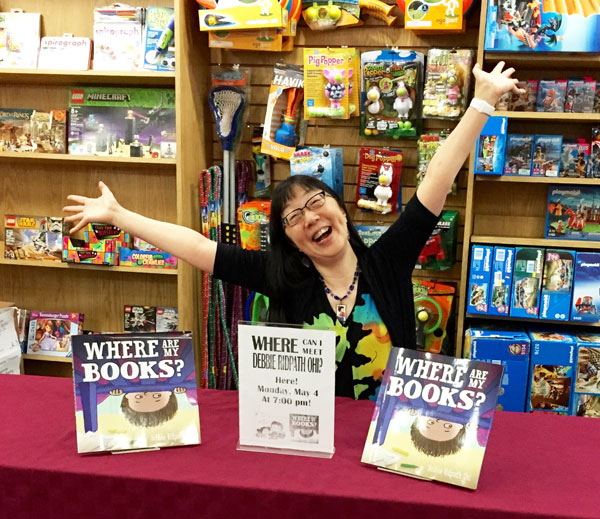
I had a FANTASTIC time during my WHERE ARE MY BOOKS? Book Tour earlier this month. Thanks to Simon & Schuster Children's for making the book tour possible for me, and to all the schools, libraries and bookstores who participated.
For those interested, I've posted links to my photos and recap at DebbieOhi.com/2015booktour, including what I learned along the way.
In prep for my workshop at CANSCAIP's Packaging Your Imagination, I asked literary agents, editors and art directors a few questions about whether they research potential clients, authors and illustrators online and what they look for. 18 editors (some of whom also look for picture book illustrators), 8 agents and 2 art directors responded.
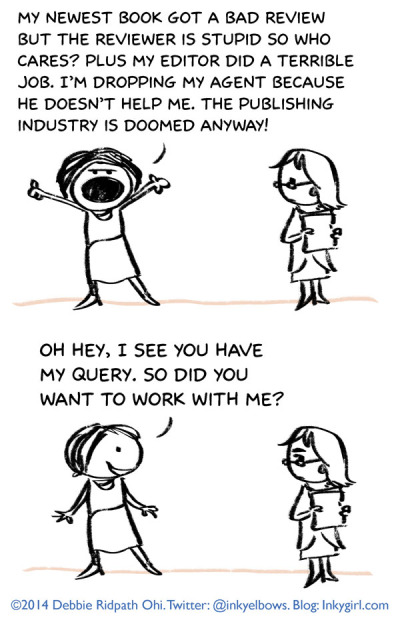
Here's what they said:
QUESTION: When you are considering taking on a new client/author/illustrator, do you ever research them online?
77% of respondents said that when they are considering taking on a new client, author and illustrator, they ALWAYS research them online. The rest said they sometimes do.
QUESTION: If you do online research before signing on a client/author/illustrator, has your research ever made you decide NOT to sign them on?
62% said that YES, they have decided to reject someone after researching them online. Some said that while they hadn't yet rejected someone after online research, they would definitely think twice about signing with someone who posts a lot of negativity (see below) or posts "with cringe-inducing syntax."
OTHER COMMENTS:
In this section, I invited respondents to volunteer additional comments, including turn-ons and turn-offs, what they look for during online research.
The following respondents gave me permission to use their names.
 Christie Harkin, Consultant Publisher at Clockwise Press:
Christie Harkin, Consultant Publisher at Clockwise Press:
"I have been turned off by authors/illustrators who bad-mouth their editors/publishers/agents. It is amazing to me when I see this on Facebook. Even if you don't mention your editor/publisher by name, it is usually very obvious to whom you are referring. I would definitely think twice about taking on someone who did this. Also, I look for authors/illustrators who are generous in sharing news about others in the community. People who only post promo about their own books (BUY MY BOOK! LOOK AT MY STUFF!) are not generally as well-received or connected with the larger community. If you are a new or emerging creator, you need to be engaging with others who are also plugged in to the kidlit world."
 Andrew Karre, Editorial Director at Carolrhoda Books:
Andrew Karre, Editorial Director at Carolrhoda Books:
"An extent online presence is not a necessity. It's gravy. But . . . I place a certain amount of value on a social media presence that seems human and natural and interesting. A Twitter stream that is full of interesting engaged conversations on a variety of topics--even topics other than books--is somewhat more interesting to me than one that is all review links and retweets. I don't much care how many followers. (Unless, of course, it's a huge number, because I am not an idiot about what that means.)"
 Carol Hinz, Editorial Director at Millbrook Press:
Carol Hinz, Editorial Director at Millbrook Press:
"I'm not necessarily looking for something in particular when I look up an author or illustrator. I simply want to find out if the person has a web presence and, if so, what it is. It's also helpful to get a sense of what else they've done, how they present themselves, whether they do school visits, and what helpful connections they may have (whether it's with other writers, educators, booksellers, etc.) when it comes to book promotion."
Other Comments:
NOTE: Most of the respondents answered anonymously but to avoid the awkward he/she decision, I decided to use "he" or "she" randomly.
One agent said she decided not to request material from previously published authors who got combative with reviewers. Another respondent said that while he hadn't yet rejected a project based on online research, he may make a note to discuss proper online etiquette with that particular author or illustrator. "But I believe the day is coming where my online research will make me answer 'no' when I question, 'Do I love this book enough to want to deal with THIS'?"
Another respondent said that online research sometimes makes her ask more questions, change the direction or focus of the conversation, dig deeper ("and not always in a negative way"), sometimes for the benefit of both of them and sometimes in ways that lead to more meaningful partnerships.
"Biggest turn-off: Writers who get argumentative and/or rude with reviewers and bloggers online. I also look at blog and social media posts that see how the writer comes across in their daily interactions. I'm wary when a writer acts rude, cynical, prejudiced, or pessimistic on social media. That's not to say that people can't have down moments, but if their overall feeds are full complaints and abuse toward others, it's an immediate "no." I've been lucky, though, to have found clients who are all positive, dedicated writers open to criticism and growing in their craft."
"I'm usually just looking for more information and/or to confirm my initial impression. I do notice if someone writes extensively about the writing and publication process ("got another rejection today!") or if he/she does a lot of self-publishing. Neither of these are deal-breakers at all, but they present unique challenges. I actually do most of my sleuthing with agents and agencies, and in that case I do judge if I see a lot of awful self-published covers (but again, may still work with them). Also, I assume writers and agents research me online but the less I'm reminded of that, the better—like don't start every email to me by mentioning something I've posted on Facebook. I don't like the feeling of someone friending me on social media in order to 'gain access.'"
"I look for obviously divisive posts, things that I see that I think would turn off a readership. Professionalism online is important, and also gives me an idea of what you'd be like to work with. I also look to see how you interact with others on your blog/twitter/site whether or not you acknowledge people who leave comments or tweet with you."
"Turn offs= being unprofessional/rude/inappropriate in a public online setting. Why would I want someone with that type of behavior linked to me as an agent and the agency as a whole?"
"When researching someone online, I'm generally just looking to flesh out my knowledge of that person in advance of a possible acquisition. I'm not actually looking for trouble spots, just maybe things to discuss at an IRL meeting with colleagues (sales points) or with the author themselves (small talk). When it's an illustrator, particularly; I do a lot of triage online before anyone's necessarily aware that I'm looking - I use online portfolios to identify leads. I'd advise artists to have as much art available to view online as possible. Use places like deviantart if you don't have a well-maintained personal site or an illustration agent with a good easily searchable site. Probably use deviantart even if you do. The easier your work is to find, the more work you'll pick up. I've been involved in acquisitions where a Google search turned up a certain amount of Internet Drama. It never really influenced the decision - we signed people up each time. I could imagine scenarios in which it would be a deal-breaker - for example, if we discovered that an author was a Neo-Nazi, that wouldn't play well - but none of them has so far come to pass. Incidentally, I think the situation in which duly diligent research is crucial is if you are an author or illustrator being offered work by a publisher or agent. You need to check out the bona fides of the person or company asking to contract with you, because there are an awful lot of sharks out there." - @iucounu on Twitter
"Turn ons - lots of work with the same energy and talent that brought the illustrator to my attention in the first place. Turn offs - samples that look dated, have styles that are very different and less appealing to me than the first sample I saw, very few samples."
"Online turn-offs: people who tweet way too often, people who only speak and don't engage others in conversation, people who are far too self-promotey, people who share way too much of their personal lives, people who are far too neurotic (tweeting constantly about writing woes and insecurities), people who are far, far, far too negative about anything and everything, and the biggest of all: people who feel the need to insult other writers/houses/editors/agents. Oh, and also, writers who quote themselves online. Online turn-ons: people who engage in meaningful discussion (without hitting me on the head with a hammer), people who find that balance between an online persona and being who they really are, people more interested in building a community than shilling their work, people who are endlessly supportive of fellow writers (without being obnoxious about it). What I really want to learn when I research a writer online is what they're after. Did they write the book to jump on the gravy train, hoping it would be the quick path to fame and fortune? Did they write the book because they scoff at the genre they just wrote and wanted to prove anyone could do it? Or is this someone who is serious about building a writing career and not just receiving the adulation of thousands of strangers? THAT'S the writer I want to work with. Someone dedicated to their craft and not their number of Facebook friends or Twitter followers."
(On whether they have rejected someone after online research) "Not if I really, really love the book, but if an author has exhibited abrasive or unpleasant behavior online, it definitely makes me think twice about signing them. When I sign someone, I'm not just signing up the project--I'm going to have to work with the author for a long time, and I prefer not to invite a headache into my life. While a great web presence is a definite plus, I'd never turn someone down for a lackluster web presence. But if I discover combative, difficult behavior, etc, I have to decide if this person is worth the unpleasantness they'll likely bring to my life. Because people are usually consistent--ie, if they're unpleasant to some people, they'll probably be unpleasant to me too if and when any difficulties in our working relationship arise."
-----
Curious about my other publishing industry surveys? Feel free to browse current and past Inkygirl Surveys online.
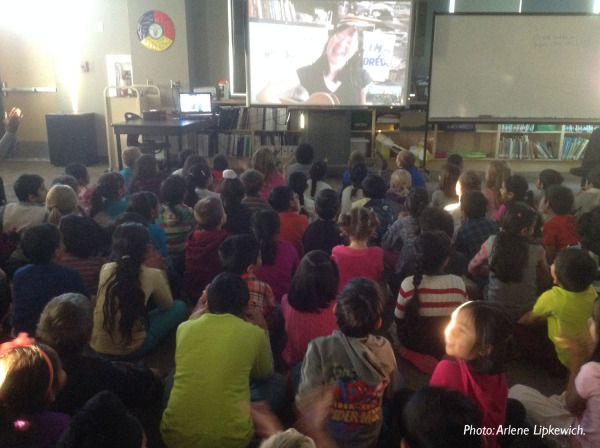 Skyping with 115 first-graders at A. Blair McPherson School in Edmonton, Alberta
Skyping with 115 first-graders at A. Blair McPherson School in Edmonton, Alberta
Although I've used Skype before, I resisted doing Skype classroom visits until recently because I wasn't confident about the technology working properly. Since I first tried Skype, however, broadband services have improved and more schools are starting to do Skype visits with authors and illustrators.
Other reasons I decided to explore visiting schools via Skype:
- I lack the time and finances to visit schools outside of the Toronto area. I also don't drive, which makes transportation more of a hassle and time-consuming.
- I had so much fun talking to young readers during my NAKED! book tour (thanks, Simon & Schuster!) that I want to do more often than I have in the past, but am limited by the reasons mentioned above.
- Although I know it can't replace in-person visits, virtual school visits enable me to use more props in my presentations, a wider range of art supplies, show students around my home office, be able to pull out musical instruments (I have many) on whim.
- I know some schools can't afford a full school visit, so I decided to offer a 15-20 minute quickie visit. Those who want a longer visit can pay my regular fee. I'm also relatively new to school visits, so this also gives schools an idea of what I'm like in person. When I do my next book tour, whether sponsored by one of my publishers or funded on my own, hopefully some of these schools will be interested in having me visit.
What I did before my first Skype visit:
- I researched a TON, searching online for blog posts by children's book authors and illustrators who have done Skype visits, as well as posts by teachers and librarians about Skype visits. I was especially interested in posts by children's book illustrators, since we have the advantage of being able to do drawing demos. :-)
- I talked to my friend Lee Wardlaw, who was also my first children's book writing mentor. Lee has a huge amount of experience presenting at schools and bookstores in person as well as via Skype. Do check out her Presentations page as well as her Secrets To A Successful Skype Visit for educators.
- I worked with teacher-librarian Arlene Lipkewich and A. Blair McPherson for my very first school Skype visit. I started with a Skype test call with Arlene and another teacher, then a Skype call with Mrs. Brooke's second grade class. Arlene gave me useful feedback which I used to tweak my setup and presentation before I Skyped with five classes (115 students) of first-graders the following week. Thanks you, Arlene and A. Blair McPherson!
- I collected some of the useful resources I've found on my Skype School Visit Page for teachers and librarians as well as children's book authors and illustrators.
What I learned and what I'd do differently next time:
- It's sooooooo much more fun than I expected!
- I strongly recommend doing a Skype test call in advance of each Skype visit as well as just before the visit itself. I found this a great way of identifying potential problems and fixing them.
- Make sure you leave time for a Q&A, and coordinate with the teacher ahead of time so that he/she is able to have students prepare questions in advance.
- Figure out how to make my own screen bigger so I can see what the kids are seeing. Try to place this screen behind the webcam so I'm looking at the camera, not away.
- If I do painting, I will NOT set the paint cups on my desk where it's way too easy for me to knock them over in the middle of the Skype session (fortunately I didn't have much liquid in each)!
- Figure out how to mute the audio on my computer so I just hear it on my headphones. I found the echo a bit confusing, and was also worried about the echo leaking through into my microphone.
Some useful resources:
Please do check out the resource list I've compiled for teachers/librarians and authors/illustrators to my Skype page; I'll be gradually updating it.
Interested in having me do a Skypevisit with your school or library? Please see the info on DebbieOhi.com/skype. Hope to visit with you soon!


By:
Debbie Ridpath Ohi,
on 10/11/2012
Blog:
Inkygirl: Daily Diversions For Writers
(
Login to Add to MyJacketFlap)
JacketFlap tags:
Promotion & Marketing,
halloween,
Picture books,
Videos,
Inspiration,
craft,
promotion,
pumpkin,
Random Diversions,
Add a tag
Wow, check out the amazing kidlit-focused pumpkin carved by children's book author/illustrator David LaRochelle:

From David:
"Chronicle Books held a promotion in conjuncture with my new book "It's a Tiger!" The winning bookstore won a custom designed pumpkin carved by me. Here is the pumpkin I carved today for Riverwalk Books in Chelan, Washington."

See a video of David carving pumpkins:
Pro-Pumpkiner from Ben Garvin on Vimeo.
Straw House, Wood House, Brick House, Blow - Wish Police Commercial from Candlewick Press on Vimeo.
Instead of making a book trailer for Straw House, Wood House, Brick House, Blow, his collection of four novellas from Candlewick, Daniel Nayeri commissioned four mini-commercials instead.
LOVE these! They're short and intriguing, and get a potential reader's attention. Many of us aren't able to afford hiring the people that Daniel did, but I do think that there are elements in these commercials that the rest of us can apply, such as keeping the video promo short. Also, I like the way the video gets across a sense of the presentation of the book, the tone and the ideas in such a short time, without attempting to summarize the plot.
You can find out more about Daniel's thoughts on book commercials, promotion and his recent projects in Mary Cole's interview at Kitlit.com.
You can also see his four book commercials on Vimeo.

















